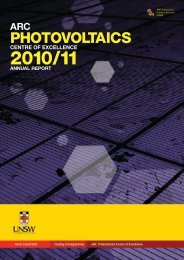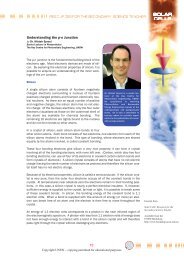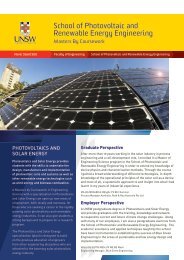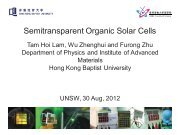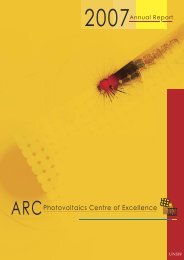Complete Report - University of New South Wales
Complete Report - University of New South Wales
Complete Report - University of New South Wales
You also want an ePaper? Increase the reach of your titles
YUMPU automatically turns print PDFs into web optimized ePapers that Google loves.
The main round <strong>of</strong> interviews for this admissions scheme was held during the week<br />
<strong>of</strong> the 26th to the 30th September. Five <strong>of</strong> the Centre’s academic staff members<br />
were involved with interviews during this week. In addition to this, one academic<br />
conducted tours <strong>of</strong> our school for prospective photovoltaic and renewable energy<br />
engineering students, and one general staff member coordinated the regional<br />
interviews in Canberra on behalf <strong>of</strong> the Faculty. This program was deemed to be<br />
very successful and will be further refi ned and administered again in 2006.<br />
5.5.5 Semi-distance Delivery Mode Trial<br />
The Centre has recognised that by being a small School, it is limited in the number<br />
<strong>of</strong> courses that it can teach each year. In an attempt at increasing the number <strong>of</strong><br />
yearly course <strong>of</strong>ferings, a second year core course, Sustainable and Renewable<br />
Energy Technologies, was delivered in a semi-distance mode in 2005. This course<br />
was available to students who had previously failed the course, missed taking the<br />
course in the previous year, or were on the Co-Op Scholarship. Lecture material<br />
was delivered via the web, and students attended a one hour tutorial one night a<br />
week, submitted assignments, and sat an examination at the end <strong>of</strong> the session.<br />
Students appreciated the evening classes, and having the opportunity to take the<br />
course in a year when it wasn’t typically <strong>of</strong>fered. The Centre is investigating this<br />
mode <strong>of</strong> delivery with more courses in 2006.<br />
5.6 Educational Resources<br />
5.6.1 <strong>New</strong> Edition <strong>of</strong> Applied Photovoltaics<br />
In 2005, revisions to the Centre’s book titled Applied Photovoltaics were fi nalised<br />
and it was re-printed ready for distribution in 2006. This book was originally<br />
published by Stuart Wenham, Martin Green, and Muriel Watt in 1995, and the<br />
revisions were the result <strong>of</strong> experience teaching a course on applied photovoltaics<br />
as part <strong>of</strong> the Centre’s undergraduate and postgraduate programs. The book<br />
examines the characteristics <strong>of</strong> sunlight, how photovoltaic devices work, and<br />
various applications for the devices including stand-alone photovoltaic systems,<br />
grid-connected photovoltaic systems, remote area power supply, and water<br />
pumping.<br />
5.6.2 Virtual Survivor game<br />
The online Virtual World Solar Challenge game,<br />
developed Jeff Cotter in 1999, is a highly successful<br />
game-based learning tool (http://wsc.pv.unsw.edu.<br />
au/) that has been played over 50,000 times by highschool<br />
students and solar racing car enthusiasts<br />
across Australia and around the world. It has been<br />
used numerous times by the School for Photovoltaic<br />
Engineering and the Faculty <strong>of</strong> Engineering for<br />
promotion and education purposes since 1999. This<br />
successful game-based learning tool grew out <strong>of</strong> a<br />
simple on-paper exercise developed for the general<br />
education course Solar Racing Cars.<br />
136<br />
The Virtual Survivor game-based learning tool comes from similar origins – an on-paper<br />
exercise developed for SOLA2053 - Sustainable and Renewable Energy Engineering. The<br />
on-paper exercise was very popular and engaging with students, and it is presently under<br />
development as a web-based tool.



